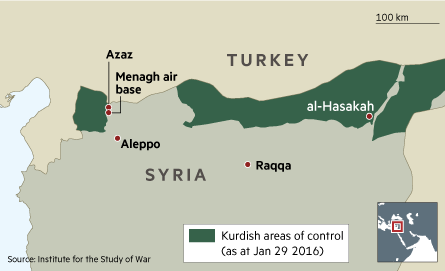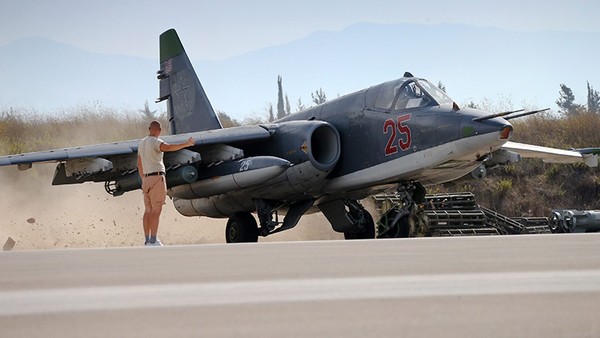Tension between Russia and Turkey has reached a new peak as the two countries step up military action in Syria in support of opposing sides, edging closer to direct confrontation in the country’s increasingly internationalised war.
The growing rift between the two countries — with each now attacking rebels the other supports — has alarmed Western diplomats amid fears Russia is seeking to undermine Nato by ramping up its clash with Ankara.
“It seems to us that just like in the Baltics, Russia wants to try and push at Nato’s ability to stand behind all its members,” said a Nato official. A senior European official said Russian President Vladimir Putin was seeking to destabilise Recep Tayyip Erdogan, his Turkish opposite number.
“Putin is furious with Turkey,” said the European official. “The situation is really incredibly serious.”
The latest rise in tension revolves around Kurdish fighters in Syria, who are backed by both Moscow and the US and other western countries but whom Ankara views as antagonists.
Moscow’s strikes against anti-Assad rebels in Syria’s northern Aleppo province have created an atmosphere of chaos that has been exploited by the Syrian Kurdish militia, known as the YPG, which has seized towns held by rebels backed by Turkey and the Gulf states.
In turn, Turkey began shelling the Kurdish fighters at the weekend, after they advanced on the Turkish border, despite warnings from Ankara to stay put. The Turkish military continued the attack on Monday, despite furious denunciations by Moscow, which called for UN condemnation of the attacks.
The Russian foreign ministry said Turkey’s actions had hit Syrian towns “recently liberated from the terrorists” by the Syrian army and Kurdish fighters, and had “killed and wounded many in the civilian population, destroyed infrastructure and residential buildings”.
Russia, which was itself accused on Monday of striking three hospitals in northern Syria, is keen to throw the spotlight on Ankara and highlight the divide between Turkey and its Nato partners.
Ankara denounces the YPG militants as an affiliate of Turkey’s own outlawed Kurdistan Workers party, which it has been fighting for three decades. It also sees the Kurdish fighters as bitter rivals of the Arab Sunni rebels Turkey favours in the Syrian conflict.
But the US prizes the YPG as the most successful Syrian groundforces against Isis, the extremist jihadi group.

Ahmet Davutoglu, Turkish prime minister, accused the YPG on Monday of being “Russia’s instrument in Syria”, threatening further attacks on the Kurdish fighters.
He said that Turkey would attack the Menagh air base north of Aleppo if Syrian Kurds did not withdraw from it and vowed to protect the Syrian border town of Azaz from the Kurdish forces.
Moscow also accused Ankara of allowing fighters to cross the border into Syria to join Isis and groups affiliated with al-Qaeda while also permitting wounded jihadist fighters to return to Turkey.
Turkey has consistently denied all such charges.
“Russia supports presenting this question in the UN Security Council to let the UNSC give a clear assessment of Ankara’s provocative line, which poses a threat to the world and to regional security in the Middle East and beyond,” the Russian foreign ministry said.
Russia’s entry into the Syrian conflict in September has led Moscow and Ankara into a strategic rivalry.
Russian military aircraft active in Syria have repeatedly violated Turkish airspace. Since the Turkish military shot down a Russian jet on the border with Syria in November, Moscow and Ankara have been in an angry stand-off.
Moscow’s criticism of the Turkish shelling in northern Syria comes as opposition groups and western leaders are urging Russia to stop the air campaign around Aleppo that has turned the military situation in favour of government troops and claimed large numbers of civilian casualties.
Despite an agreement that a ceasefire should start later this week which requires all conflict parties to scale down fighting, the Russian air strikes have shown no sign of abating.
The Russian government claimed on Monday that its Aleppo campaign was not subject to the ceasefire. “We fight against terrorist groups — Isis, Jabhat al-Nusra and others connected with al-Qaeda. Strikes on objects of terrorist groups will continue in any case, even if we succeed in agreeing on a ceasefire in Syria,” deputy foreign minister Gennady Gatilov told German magazine Der Spiegel.
Reporting by Erika Solomon in Beirut, Kathrin Hille in Moscow, Mehul Srivastava in Istanbul and Sam Jones in London




Leave a Reply
You must be logged in to post a comment.